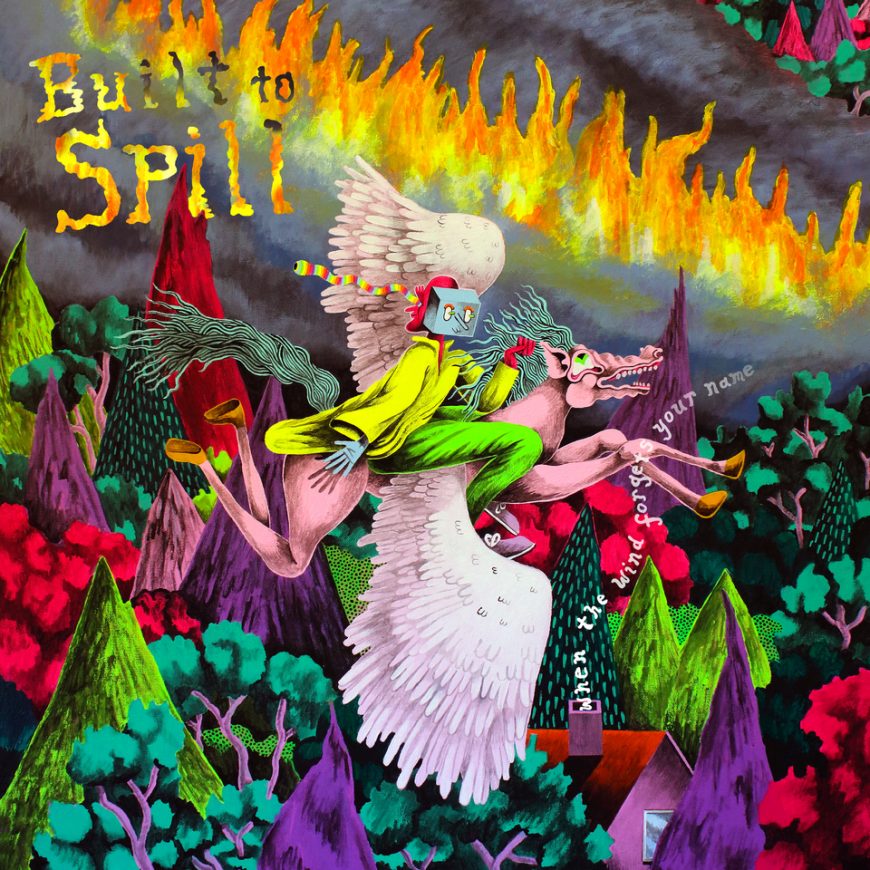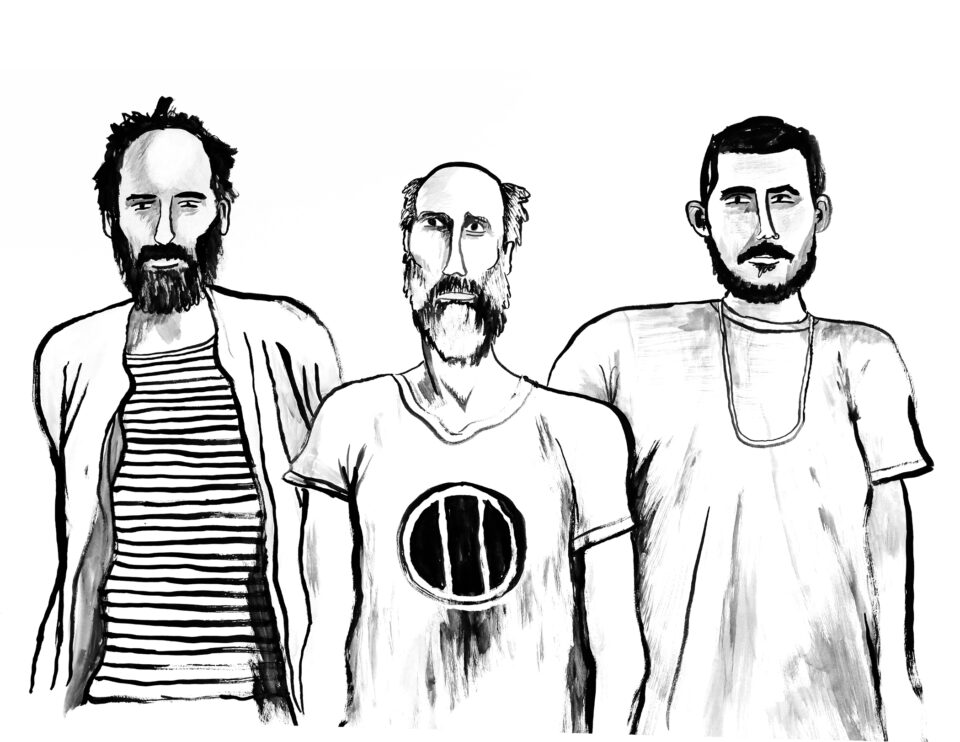Repeat this question and let it slot into your mind after 30 years: Is Built to Spill classic rock now? From a certain point of view, this is true. The Boise rockers and their easygoing frontman Doug Martsch have left their indelible mark on bands like Modest Mouse, Band of Horses, and Death Cab for Cutie, but their classic tracks are far from attic-stored artifacts—these songs are meant to be taken on road trips every few years, with Martsch and his revolving cast of bandmates serving up mythological riffs that twist in our hearts like a loose cassette tape spilling out of a car stereo.
Seattle-based artist Alex Graham has fond memories of listening to the band’s latest release as she painted the psychedelic album cover for their ninth album When the Wind Forgets Your Name using acrylic and tempera paint on canvas. She was inspired as she drifted off to sleep after a “vision of a blockheaded guy riding a pegasus” flashed into view—a perfect visual representation of the LP, which mixes the ordinary with the extraordinary. Graham’s favorite song by the band is the soaring “You Were Right” from their 1999 album Keep It Like a Secret: “It references a bunch of my other favorite songs. I’m a sucker for classic rock.” There’s that word again.
Martsch’s best tracks tend to deal with very personal issues in the most epic ways, and his most recent album approaches the foothills of those mountains once you sit at their elevation for a spell. The true classic rockers such as Neil Young and Bruce Springsteen really don’t conform to trends—and when they do, it’s usually in revolt of some establishment. Martsch follows in the footsteps of these giants, painting himself as a journeyman punching the clock above the stereo.
Here, he talks about his new bandmates, why he doesn’t like some of his old work, and some favorite moments on the new record.
I enjoyed the new record. You connected with Oruã, the Brazilian band you worked with on it, when you needed a touring group in Brazil?
We had the shows booked in Brazil, and then I parted ways with my band members and kind of tried to stick together some people here in America and just couldn’t find the right people in a hurry. I’d met this woman Iza on Instagram because she’d asked about us coming to Brazil, so she and I had been having a conversation for about a year about getting us over there. In the meantime, she turned me onto Lê Almeida, who’s the singer and guitar player, so I just asked if they would be available to play in the band. They were familiar with Built to Spill’s music, so they rehearsed a little bit and then I went down there. We all liked doing it enough that we decided to do it for 2019 and tour Europe and America together, and then in the course of most of that touring, we learned this batch of songs that I’d been working on with the other guys for the last few years.

“I thought it was a little bit of a serious, pretentious album title, even though I liked it. I thought it would be nice to have artwork that juxtaposed it with a little bit more color and silliness.”
Does it seem like touring is kind of a strong connection point for creating and sustaining a network of bandmates, always kind of having that revolving door for the group?
Yeah, part of it is trying to make different kinds of music and not getting into a creative rut. Part of it is just having different people around—something where we’re enjoying each other’s company, we’re not burnt out on each other. There are other reasons too, like just the availability of people. The circumstances are always different, but I love everyone I’ve played with. I’ve been proud of all the bands, very proud of the band on the record, and really proud of the band that I’m playing with today.
Speaking of being proud, you mentioned that one of your favorite parts of the new record was the cover art by Alex Graham. Take me through how you first heard about her art and how that worked out.
I started following her comic called Dog Biscuits on Instagram in 2020. She started it maybe a month or two into the pandemic, and it kind of took place in the pandemic. I just really related to it and thought it was beautiful and well-written. She also happened to be a painter. It seemed kind of like an obvious choice. I already had the title of the record. I thought it was a little bit of a serious, pretentious title, even though I liked it. I thought it would be nice to have artwork that juxtaposed it with a little bit more color and silliness.

I really enjoyed the lyrics on “Understood.” They almost felt like a mantra the way they were sung. Did you put those lyrics together during the pandemic?
No, that song was written a few years before. It’s like almost all Built to Spill songs where the lyrics are kind of touching on different subjects. There are lines that go together and mean something together, and then the next thing might be a totally other subject. For me, lyrics are hard to write. They take a long time, and a lot of tries before I come up with things that I think are good. By the time I’m done, I’m almost always pretty happy with it. It’s kind of just like a weird puzzle that I’m putting together. For some reason, it feels right at some point. But until I get there it seems impossible.
You obviously noodle on certain elements of songs for years. What songs on this record spark that inspiration and joy for you?
I think for me it was just kind of different, subtle things. Like on “Gonna Lose” there’s a part where it breaks down, and there’s this quiet singing, and when it comes back into the main part of the song at the very end I added a couple of little guitar whammy-bar things that make the tone go down. On “Fool’s Gold,” I like the way the main guitar solo sounds—I feel like it pops out in a really nice way. There’s some stuff Lê did right before it goes into the last chorus, these swelling cymbals.
“For me, lyrics are hard to write. It’s kind of just like a weird puzzle that I’m putting together. For some reason, it feels right at some point. But until I get there it seems impossible.”
I’ve noticed a trend where you mention your old songs and you don’t really see them in the best light now. Have there been any particular songs or albums where you originally were really down on it, but then you came around to it?
Just the other day we were driving and a couple of Built to Spill songs came on that I hadn’t heard in a long time, and they sounded pretty disappointing to me. I was disappointed with their overall production and the quality of my voice. I realized that I liked them when I did them because, at the time, I had just finished mixing them, so I’d taken all of these elements of the song and I’d worked hard and gotten them organized into the way that I wanted them to be, where I could hear everything as clearly as possible. I just felt like I’d really gotten them as good as I could get them at the time, and they were satisfying because everything was sort of in place. But now, listening back, it’s not really the way that I think music should sound.
I like most of our songs, and I like playing them live. I like being able to do what I want with them today. I feel like a lot of songs I like, the live versions of them are better than the recordings for whatever reason. I just feel like I have better energy. I feel like I sing better. I’m still not a good singer, but I feel like I have a little bit more emotion in my voice than I do on the records.
Speaking of old songs, one of my favorites has always been “Twin Falls.” Looking back, what are some of your favorite memories from those younger days growing up there?
I feel like I had a pretty nice time growing up. I had a nice family that was really loving. I had a lot of good friends there. I felt like I was always pretty well-entertained, had a good imagination, and played a lot of sports. I felt like a really normal kid and felt like almost everything about me was perfectly average about my life, but I thought it was fine.
You’ve said in the past that your mom stood out as a strong figure of support for your music.
Well, she came from a small town in Idaho—Rupert—and she got married really young and had my brother and sister, and they’re six and eight years older than me. When I was born, she and my dad got divorced before I was a year old, and she moved to Twin Falls, and that was all pretty bold stuff for a Rupert person. She started working at Health and Welfare and she actually started learning about the struggles of people and became a kind of liberal Democrat. She really wasn’t raised that way, but learned that stuff. She’s a real life-of-the-party-type of lady. She was always cracking jokes. She’s just got a really sweet attitude, and she’s always taken really good care of me. I’m also the baby, so I’ve always been treated extra special.
“I feel like a lot of [our old] songs I like, the live versions of them are better than the recordings for whatever reason. I just feel like I have better energy. I feel like I sing better.”
I think it was in some interview a few years back that mentioned during the pandemic you’ve been playing a lot of The Legend of Zelda—is that the recent one, or is that an old one?
Yeah. I got The Breath of the Wild for Christmas from my son in 2019. I started to play it, and I was like, “I don’t have time for this video game—it’s too complex, too much going on, and I’ve got too much going on.” Then, all of a sudden I have months and months and months of time alone, and low and behold, I was able to finish it.
That’s a cool one. It kind of reminded me of the original games, since they didn’t really hold your hand. You can kind of just explore and take it in any direction.
I’ve played a few of them, but I definitely had to have a guide to figure everything out. In this one, I couldn’t find a guide, and I was like, “Oh well, I’ll just see what I can do,” and I was able to pretty much finish it all without the guide. I guess I didn’t get every Korok Seed or something. I know there’s something I didn’t get. It was definitely the best game I’ve ever played. I love it so much. FL







